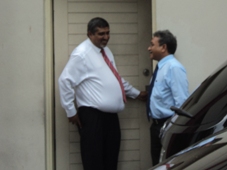Endemic sexual violence against women and children, violent crime, abuse of migrant labourers and a persistent culture of torture in detention facilities are among a catalogue of serious issues facing the country, the Human Rights Commission of the Maldives (HRCM) has informed the UN Human Rights Committee.
The document summarises areas relevant to the International Covenant on Civil and Political Rights (ICCPR), which the Maldives acceded to in 2006. It heavily references the Maldives Journalists Association (MJA) and several news sources, including Haveeru and Minivan News, with little reference to primary research conducted by HRCM itself.
Violence against women
“One in five women between the ages of 15 and 49 years reported physical or sexual violence by a partner, and one in nine reported experiencing severe violence,” HRCM noted, referencing a 2006 study by the then Ministry of Gender and Family.
“One in six women in the capital Male’ and one in eight countrywide reported experiencing childhood sexual abuse under the age of 15 years. Of those women between the ages of 15 and 49 years who had ever been pregnant, 6 percent reported having been physically or sexually abused during pregnancy,” it cited.
“The survey further reported that many respondents’ perceived women to be subordinate to men, and that men used Islam to justify restrictions and violence against women.”
Parallel to this, HRCM observed a particularly low conviction rate for rapists and sexual assault offenders.
Reasons for this, the report claimed, included “the absence of an Evidence Act, the lack of witness protections provisions and fear of reprisals by abusers, finding witnesses (two male or equivalent women), awareness on the side of the victim regarding the condition that she should be in while reporting, such as not showering before consulting medical personnel, lack of national guidelines on medico-legal documentation, failures of existing laws and procedures leading to re‐victimisation of the victim, and intimidation of being stigmatised by the community.”
Forced labour
Abuse of migrant workers in the Maldives is occurring on an industrial scale, with at least 30,000 foreign workers (8-10 percent of the total population of the country), completely undocumented. Most of these are Bangladeshi nationals, with 2200 of those 2700 migrant workers deported in 2009 by the Department of Immigration and Emigration of Bangladeshi origin, HRCM noted.
“The State needs to enforce existing regulations relating to work place standards and regularly monitor the same,” the report noted. “In addition, the state should develop a mechanism whereby the wages to the workers are duly paid and the travel documents of migrant workers are not held in hands of employers in order to eliminate the undue influence by employers on the migrant workers to work in unfavourable conditions, including forcing them to do labour against their will.”
Documents of migrant workers such as passports were routinely confiscated by employers, the report stated.
“In the Maldives, it is a practice to take hold of the passport of the migrant worker by his/her owner for the intention of safe keeping, and this applies to both government and private sector together with the individuals,” HRCM said.
HRCM observed that the maximum fine facing labour traffickers for fines under the Employment Act was Rf 5000 (US$324). It noted that the Maldives had conceded to ratify the International Convention on Protection of Rights of All Migrant Workers and Their Families (ICPRMWF).
Violent crime
HRCM noted six crime-related deaths in 2010 and eight in 2009, and stated that this was high relative to the population.
“It is to be noted that most of the people who are involved in cases of extreme violence, and murders are repeat offenders (sometimes juveniles) providing clear evidence into the failure of the criminal justice system in the country,” HRCM stated.
Factors involved, the report noted, included “inadequate legislation pertaining the criminal justice system, such as a Penal Code does not reflect the spirit of the present Constitution, inadequate legislation pertaining to evidence and witnesses, dismissal of forensic evidence by courts, absence of a witness protection program and inadequate correctional and rehabilitation system for convicted offenders.”
Detention concerns
Visits from the National Preventive Mechanism (NPM) to Dhoonidhoo Police Custodial in March 2011 identified that five detainees had been kept in solitary confinement cells for periods ranging from several days to up to four months, without being let outside for exercise, HRCM stated,
HRCM also raised concerns about the standard of a “hastily built” jail in Addu Atoll in 2009, consisting of metal cages, to accommodate prisoners following a prison fire in Maafushi, and the confiscation of clothing as a disciplinary measure.
HRCM noted a general failure to keep arrested suspects separate from convicted criminals, and commented on the use of Maafushi prison as a police custodial.
The report also stated that “a high profile politician, Mr Abdulla Yameen, was held under protective police custody for a short period in 2010 in a place outside the formally established places for police custody” (Yameen, the leader of the opposition-aligned People’s Alliance and the former President’s half-brother, was detained in the Presidential Retreat at Aarah).
HRCM expressed concern that “in the case of Mr Yameen, he has not been compensated so far [for his detention on the Presidential Retreat].”
Read the full report
